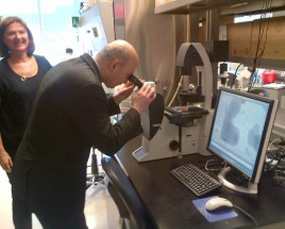This week, we’ll look at two big conferences that may be affecting the future policy for everything from pharmaceutical research and development funding to drug sales regulations. BIO, a large, international conference, and the Quebec-based Assises nationales sur la recherche et l’innovation.
As of today, delegates from the Ontario government are meeting at the 2013 BIO conference in Chicago. An annual event spanning the participation of 65 countries, BIO is big news for anyone working or studying to be part of pharmaceutical manufacturing and research. It’s a place where pharmaceutical and medical research-boosting strategy is discussed; business and government connect; and even new policy is made. For example in 2006, the Ontario government signed a Memorandum of Understanding with the state of Illinois, connecting the two jurisdictions for better collaboration.
The focus on the conference is building connections, and Ontario is sure to encounter some new and exciting ideas. This year, the delegates will have a chance to attend the latest presentations on Alzheimer research, one-on-one meetings with representatives from the latest biotech start-ups, and big pharmaceutical Rx&D companies.

Photo source:mri.gov.on.ca/
Ontario delegates at BIO
BIO is coming on the heels of the April’s Quebec Conference on Research and Innovation (Assises nationales sur la recherche et l’innovation). This regional consultative conference aims at gathering all Quebec stakeholders around a consensus. Historically, Quebec has had a very strong biotechnology research sector, but it still needs to work hard to keep it. This year, the province created the PNRI (Politique nationale de la recherche et de l’innovation) to help it fulfill its goal of a shift in funding strategies. Unfortunately, the full plans for the funding changes are still awaiting further announcements this spring- in politics as in clinical research, a great deal of patience is necessary to see results.
These conferences are especially important if you’re a pharmaceutical quality assurance student who intends to work and study right here in Ontario as their job will certainly be affected by other big markets, like Quebec. In fact, they are important for all graduates, whether they choose to be on the research side or representing pharmaceutical sales. In Canada, there are a dizzying number of actors involved in deciding the rules and funding for medical and pharmaceutical manufacturing. These conferences are unique occasions for everyone to be heard.
How do you think expanded services effect the pharmaceutical industry?



